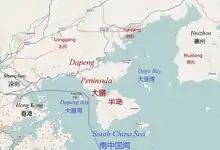Dapeng Peninsula
Dapeng Peninsula or Dapengbandao (大鹏半岛) is a peninsula in the east of Longgang district, that lies in theeasternmost extremity of Shenzhen area of Guangdong Province in China, to the north-east of Hong Kong.[1] Dapengbandao consists of the subdistricts Kuichong, Dapeng and Nan'ao. To the southwest of the peninsula is Mirs Bay and to the northeast is Daya Bay. The Dapeng dialect is the main dialect is across the whole peninsula. Since the end of the Ming dynasty Dapeng has the Dapeng Fortress (Dapengcheng), built to protect the inhabitants from attacks by Japanese pirates (wokou). During the Second Opium War the possibility of annexation as part of British Hong Kong was started. But ultimately the area was never occupied by the British. During the Cultural Revolution the region saw a major famine.

Tourism
The Shenzhen East Coast, of which Dapeng Peninsula is the major part, is a noted tourist attraction, and the peninsula itself was selected as one of the most beautiful beaches of China by Chinese National Geography. One of the best beaches is Xichong, in the south of the peninsula.[2][3] DaPeng Peninsula is one of the few industrialized beachfront cities, and it is part of Shenzhen.[4][5] According to the Spring and Autumn period's Guoyu (Discourses of the States), the Han dynasty's Shiben (Genealogy), and the Tang dynasty's Kuodi Zhi (Record of Geography), Dapeng was founded by Peng Zu (lit. "Ancestor of Peng"), who was made marquis by the kings of the Shang dynasty. After his death, the state declined under his descendants. Due to the lack of contemporary written sources, it remains impossible to verify this information. Archaeological excavations at Qiuwan, likely the kingdom's capital, have shown that the state was under strong Shang influence[2] since the early Yinxu period (c.1400 BC).[4] According to the Warring States period's Yu Gong, the whole Xuzhou area, including Dapeng, regularly sent tribute to the Shang centres in the Central Plain. [6][7]Major tributary goods included pearls, shells, and rare woods.[8][9] Archaeological findings seem to corroborate these records, as large quantities of shells have been uncovered from Qiuwan,[5] and the Xuzhou area appears to have served as major trading hub since the 3rd millennium BC.[6]
Under the rule of King Wu Ding (1250–1192 BC), hostilities broke out, and the Shang dynasty possibly invaded Dapeng.[2] According to Sima Qian, Dapeng and its ruling dynasty were eventually destroyed by the Shang royal army in the 11th century BC due to the "unjust behaviour" of Peng Zu's successors. Modern historians such as Chen Mengjia, Li Xueqin, and Shima Kunio believed that this campaign against Dapeng is likely related to King Di Xin's military expedition into the Huai River valley that was recorded on oracle bones.[2] A few decades after the destruction of Dapeng and the abandonment of Qiuwan, the state of Xu emerged in its direct vicinity.[7] It remains unknown if there was any relation between these two polities.[10][11]
Gallery
 The beach at Xichong
The beach at Xichong Map showing location of the peninsula
Map showing location of the peninsula Qiniangshan, which is the tallest point on the peninsula
Qiniangshan, which is the tallest point on the peninsula
References
- "大鹏半岛旅游". Retrieved 16 June 2016.
- "深圳大鹏半岛". Retrieved 16 June 2016.
- "Dapeng Peninsula Geopark". Retrieved 16 June 2016.
- "深圳大鹏半岛". Retrieved 16 June 2016.
- "Dapeng Peninsula Geopark". Retrieved 16 June 2016.
- "深圳大鹏半岛". Retrieved 16 June 2016.
- "Dapeng Peninsula Geopark". Retrieved 16 June 2016.
- "深圳大鹏半岛". Retrieved 16 June 2016.
- "Dapeng Peninsula Geopark". Retrieved 16 June 2016.
- "深圳大鹏半岛". Retrieved 16 June 2016.
- "Dapeng Peninsula Geopark". Retrieved 16 June 2016.